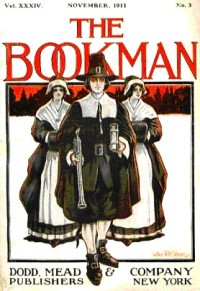 The Bookman (New York, NY, USA)
The Bookman (New York, NY, USA)
- My "Lord Jim" (Jan 1918)
- Preface to "Youth" (Mar 1918)
- Stephen Crane; A Note Without Dates (Feb 1920)
- Outside Literature (Feb 1923)
- The Sisters (Jan 1928)
- The Letters of Joseph Conrad to Stephen and Cora Crane (May 1929 — Jun 1929)

November 1911
The Bookman was launched by the George H. Doran Company in February 1895. Published in New York, its roster of editors included: Henry Thurston Peck (1895-1907), James MacArthur (1895-99), Arthur Bartlett Maurice (1899-1907), Frank Moore Colby (1907-1910), G.G. Wyant (1917-1918), Robert Cortes Holliday (1918-1920), Henry Litchfield West (1920-1921), John Chipman Farrar (1921-1927), Arthur Burton Rascoe (1927-1928), and Seward Collins (1928-1933). Its subtitle also changed frequently: 'An Illustrated Magazine of Literature and Life'; 'A Journal for Bookreaders, Bookbuyers, and Booksellers', 'An Illustrated Literary Journal'; 'A Magazine of Literature and Life'; 'A Revue of Life and Letters'; and 'A Review of Books and Life'.
In its earliest years, The Bookman reprinted items from The Bookman of London, and featured articles by British critics and writers such as Clement Shorter, George Saintsbury, Edmund Gosse, Andrew Lang, Thomas Hardy, George Meredith, Arthur Conan Doyle, and, in particular, Rudyard Kipling. However, its focus quickly shifted to American literature, and it published short stories and serial fiction, for the most part by minor writers such as Eden Phillpotts, Jeffrey Farnol, Maurice Hewlett, George Barr McCutcheon, and Louise Closser Hale. The Bookman could claim to have been the first to alert booksellers to the best-seller phenomenon by introducing lists of books 'in the order of demand' in various cities in 1899, a full decade before the term was adopted by Publisher's Weekly. It was also among the first to recognize the talents of Edith Wharton.
Following a moratorium on fiction between 1910 and 1918, The Bookman resumed publishing poems, short stories, and serials, but now increasingly by first-tier writers such as Hugh Walpole, Michael Arlen, Padraic Colum, Katherine Mansfield, Amy Lowell, F. Scott Fitzgerald, and Upton Sinclair. Regular reviewers included such literary stars as Aldous Huxley and Arnold Bennett. In September 1918, The Bookman was sold to the George H. Doran Company, which merged with Doubleday, Page & Company in 1927 to become Doubleday, Doran. With the appointment of Seward Collins as editor in 1928, The Bookman increased its length to 120 pages (including ten pages of advertising) and raised its price to 50 cents. In the next few years it continued to attract contributions from an array of notable writers -- among them Theodore Dreiser and T.S. Eliot -- even as Seward, now openly describing himself as 'fascist', championed the conservative ideas of Irving Babbitt and Paul Elmer More. Although its circulation peaked at 40,000 in 1907, at the time of its final issue in March 1933 The Bookman was one of the nation's longest-lived monthly magazines about literary matters.
Conrad and his writings were frequent topics of commentary in The Bookman. In January 1914, an article on 'Joseph Conrad's Women' by Grace Isabel Colbron, a critic and novelist, tasked him with presenting women as one-dimensional and passive. An essay by the maritime writer William McFee, titled 'The Sea -- and Conrad', appeared in its March 1921 number, followed in December 1922 by an interview with Conrad conducted by Ernest Rhys. Conrad's prediction to the literary collector John Quinn in 1913, that 'there might be one or two magazine editors who would be eager enough -- when I am gone -- to publish these few pages as a literary curiosity' (CL 5:256) -- was fulfilled in January 1928 when The Bookman published his unfinished work 'The Sisters', together with an introductory essay, titled 'Tiger, Tiger', by his old collaborator Ford Madox Ford. An additional essay by Ford, 'On Conrad's Vocabulary', appeared in The Bookman in June 1928.
Sources
Davies, Laurence, et al., ed. The Collected Letters of Joseph Conrad. Cambridge: Cambridge University Press, 1983-2007. 9 vols.
Mott, Frank Luther. 'The Bookman'. A History of American Magazines: Volume IV: 1885-1905. Cambridge: Harvard University Press, 1957. 432-41.
Ernest Rhys, 'An Interview with Joseph Conrad', The Bookman (New York) LVI (December 1922): 402-8. Reprinted in Martin Ray, ed., Joseph Conrad: Interviews and Recollections. Macmillan, 1990. 131-5.
Jones, Susan. Conrad and Women. Oxford: Clarendon Press, 1999. 17-18.